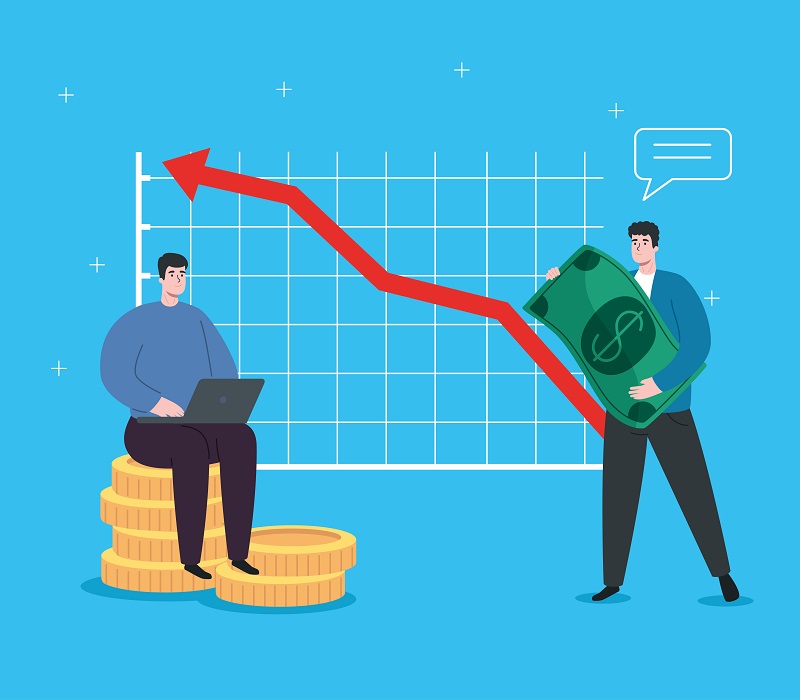Investing Vs Trading : Which Is More Profitable?
Understanding the many terminologies used in financial markets is critical to gaining the skills required to attain your financial goals. And the distinction between online stock trading and investing in the stock market should be made clear from the start.
Because both entail creating an account with a broker and purchasing and selling financial assets such as stocks, commodities, or indices, the phrases “trading” and “investing” are frequently used interchangeably.
However, there are significant differences between Trading and investing or stock and trade, and in this tutorial, we will explain what lies behind “investing vs. trading” so that you can benefit from the stock market analysis
Investing vs Trading Definitions
When deciding to make money through the stock market trading by stock and trade, there is always some misconception between the phrases trading and investing that must be cleared up. Investing in the stock market trading entails keeping a position or asset for a longer period of time, whereas Trading is affected by the rise and fall of the stock market’s securities.
Furthermore, there are other distinctions between Trading and investing like short selling stocks that affect how money moves in the market.
What does Investing in the stock market mean?
Investing vs trading is a long-term strategy that tries to steadily create wealth over time using various investment schemes such as mutual funds, buying and selling a portfolio of stocks and bonds, and much more.
Furthermore, investing is held for years or decades and comes with numerous benefits such as interest, dividends, stock splits, and many more. Furthermore, the risk of market downtrends and volatility is eliminated in investing because there is always the expectation that prices will rise. As a result, because it is a long-term investment, the investor does not need to be concerned about the current slump.
Investors are less concerned with market ups and downs and more interested in market fundamentals such as the Price to Earnings Ratio (P/E Ratio) over the long run.
What Trading in the stock market means?
Trading in the stock market, as opposed to investing, is a short-term and volatile practice that involves numerous transactions depending on market patterns. When compared to long-term investments such as mutual funds and bonds, Trading is comparatively short-term. Stocks, commodities, currencies, and other financial instruments are common examples of Trading, and the only benefit of Trading is increased profit.
A long-term investor, for example, makes a profit of 10-15% every year, whereas a trader can earn the same amount monthly, depending on the trader’s choices and judgments.
Furthermore, Trading is a dynamic and volatile money-making activity in which market ups and downs have a direct impact on the Trading and can result in both large profits and losses.
However, the primary principle of Trading is to buy stocks at a low price and sell when the price rises, and only experienced traders can make large profits in a short time.
What is the difference between Trading and investing?
The first and most obvious difference between Trading and investing is the amount of time a position is normally kept. Investing in stock and trade requires techniques with far longer time horizons, whereas Trading seeks to profit from short-term price movements. Here are some more distinctions between Trading and investing.
Source:https://www.investopedia.com/ask/answers/12/difference-investing-trading.asp
1. Risk of losing money
Any investment entails the risk of losing money, but buying and selling equities for investing purposes becomes riskier as the timetable shortens. And the more you concentrate your money on a few holdings, the more difficulties you will have in Trading. Furthermore, recoveries from any downturn in the stock market can take years, which means that traders who purchase shares of stocks whose prices decrease may not have the time to wait for a return.
However, when the broader stock market rebounds, not all company stocks recover, and as a result, many traders risk losing money. Investing in diversified funds or stock and trade, on the other hand, spreads your money over multiple companies, which helps to smooth out any dips that an individual company may face and provides higher returns.
Aside from the faster earnings, many traders frequently purchase assets such as options and futures contracts, as well as the use of margin, which is a type of loan offered by brokerages to traders as collateral. These tactics provide traders with a bigger potential for profit earnings, but they also carry higher risks of loss, and in the event of margin trading, the loss is considerably greater.
2. Tax Benefits
Every time you make a profit, you must pay tax, and this is true for both Trading and investing; however, investing has a lower tax cut than Trading. This is because individual stocks, ETFs, and mutual funds are taxed depending on how long they are held.
In Trading, however, you must pay taxes on your earnings at the same rate as you do on your paycheck. This is because stock and trade is done for short periods of time, but investing is done for the long term and has a somewhat lower tax rate, known as the long-term capital gain rate.
When you suffer losses rather than gains, whether short-term or long-term, you can use them to make other investments or deduct them from your taxes using a practice known as tax-loss harvesting.
3. Effort and time
Because of the quantity of research and transactions required, online trading can be a full-time profession. Whereas investing can be for the long term, it is frequently supposed to be set and forgotten since individuals buy a diversified fund and profit from the stock market’s long-term returns with little effort.
This means that investors are less likely to experience the full range of market ups and downs. At the same time, traders must react to market developments in real-time in order to outperform market returns.
Investing vs Trading : Which is better for you?
When the difference between Trading and investing is compared to the active and passive investment, the two investing styles appear to be identical. This is because passive investing entails buying and holding and is dependent on the fundamental performance of the underlying business to provide higher returns. So, as the price rises, you hold it rather than sell it for a profit.
Active investing is similar to online stock trading in that it attempts to outperform the market by purchasing and selling in and out of the market at favorable moments. As a result, traders seek the finest opportunities while avoiding declining stocks.
Trading, on the other hand, promises bigger returns because, whereas an investor could expect to earn 8-10% on their portfolio each year, stock market trading can earn considerably more per month.
As a result, crowning either technique of stock and trade as the ideal way to approach the stock market is challenging. However, if you have a low-risk tolerance and wish to minimize volatility, you should consider investing.
Takeaway
Trading is an exciting method to make rapid money through online trading, but it can quickly lead to large losses, whereas investing means long-term profits and fewer catastrophic losses. The main distinction between Trading and investing is in their methodologies, risk, and time required, and you can choose either depending on your risk tolerance and patience.
FAQs
1. Which is preferable: Trading or investing?
It is acceptable to do both, and it is up to the individual’s risk-taking abilities and patience to select between the two. Investing is a long-term strategy with lower risk, whereas online stock trading is a short-term strategy with high risk.
2. Which is riskier, Investing or trading?
Trading entails more risk than investing and has a higher risk-reward ratio. The risk is lower when investing over the long run.
3. Who makes more money, investors or traders?
Both make money, but traders frequently make more money than investors when they make the right selections and the market performs well.

